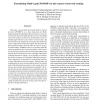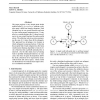250 search results - page 22 / 50 » Learning action effects in partially observable domains |
87
Voted
IJCAI
2007
15 years 1 months ago
2007
Most work on Predictive Representations of State (PSRs) has focused on learning and planning in unstructured domains (for example, those represented by flat POMDPs). This paper e...
123
click to vote
ECCV
2006
Springer
15 years 1 months ago
2006
Springer
Our goal is to automatically segment and recognize basic human actions, such as stand, walk and wave hands, from a sequence of joint positions or pose angles. Such recognition is d...
CONNECTION
2006
14 years 11 months ago
2006
By learning a range of possible times over which the effect of an action can take place, a robot can reason more effectively about causal and contingent relationships in the world...
112
click to vote
HICSS
2003
IEEE
15 years 5 months ago
2003
IEEE
This paper uses partially observable Markov decision processes (POMDP’s) as a basic framework for MultiAgent planning. We distinguish three perspectives: first one is that of a...
ICML
2003
IEEE
16 years 17 days ago
2003
IEEE
The paper explores a very simple agent design method called Q-decomposition, wherein a complex agent is built from simpler subagents. Each subagent has its own reward function and...


